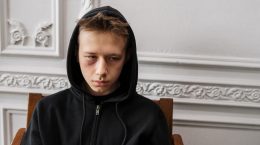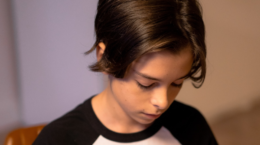Children in distress need protection much more than adults. They cannot independently seek help, and adults are always responsible for them and often decide their fate without caring for their welfare. That is why «Our House» undertook to protect the Belarusian children. We will tell you what we have done over the year in the context of the campaign «Not-Children Play».
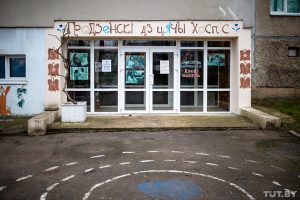 In 2020, we launched a rescue campaign for the Grodno Children’s Hospice. After its director, Olga Velichko supported Viktor Babariko in the elections and then began to participate in the protests, the illegitimate authorities began checks and searches, took away the premises from the hospice, and opened a criminal case against Olga. «Our House» continued its campaign to protect the children’s hospice in 2021. In March, we said that Michael Ekke, the mayor of the German Minden, sister city of Grodno, wrote a letter to the Grodno City Executive Committee chairman Mieczyslaw Goy and asked him to clarify the situation in the children’s hospice. Mieczyslaw Goy replied that children in need of palliative care receive it primarily from the state. Also, in March, we told the latest news about the Grodno Children’s Hospice – that the security forces continue to terrorize the institution with searches and frighten patients, as well as their parents.
In 2020, we launched a rescue campaign for the Grodno Children’s Hospice. After its director, Olga Velichko supported Viktor Babariko in the elections and then began to participate in the protests, the illegitimate authorities began checks and searches, took away the premises from the hospice, and opened a criminal case against Olga. «Our House» continued its campaign to protect the children’s hospice in 2021. In March, we said that Michael Ekke, the mayor of the German Minden, sister city of Grodno, wrote a letter to the Grodno City Executive Committee chairman Mieczyslaw Goy and asked him to clarify the situation in the children’s hospice. Mieczyslaw Goy replied that children in need of palliative care receive it primarily from the state. Also, in March, we told the latest news about the Grodno Children’s Hospice – that the security forces continue to terrorize the institution with searches and frighten patients, as well as their parents.
In March, we wrote the story of 9-year-old Vasily Ovchinnikov, who ended up in the SOP, although he lived in an apartment with an excellent repair, attended sections and circles, went to school. His father supported the protests, and the pressure on him began. They decided to remove Vasily from the family. Father and son left for Moscow to escape the persecution of the guardianship authorities. But even there, they began to threaten them because the administration of the Leninsky district considered that the father was drawing his son into antisocial activities. This verdict appeared after Vasily’s father published a photo of his son with Sergei Tikhanovsky on social networks.
In March, our website published an article about corruption in the Ministry of Health, about how Belarusian children got injected with an untested vaccine from South Korea in 2018. We said that Belarus provided babies for a medical experiment – and as a result, one child died. And the journalist Sergei Satsuk, who wrote about this, was detained and became a suspect in a criminal case. Looking ahead, we will tell you that Sergei Satsuk was then released, but in December 2021, he got again suspected of taking a bribe (article 430 of the Criminal Code). He is now in jail.
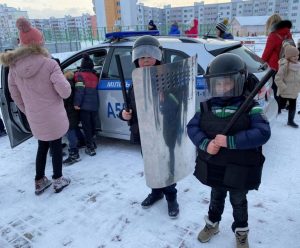 In 2021, we twice talked about how the police from an early age accustom Belarusians to weapons. In March, we prepared a review of how children are taught to hold weapons, to shoot and beat criminals. And a second review on the same topic appeared on our website in December – we dedicated it to the strange traditions of the usurper in organizing children’s New Year’s holidays.
In 2021, we twice talked about how the police from an early age accustom Belarusians to weapons. In March, we prepared a review of how children are taught to hold weapons, to shoot and beat criminals. And a second review on the same topic appeared on our website in December – we dedicated it to the strange traditions of the usurper in organizing children’s New Year’s holidays.
This year, we have compiled several monitoring reports on repressions against children in Belarus. In April, we talked about minors, kicked out of the team for their position and detained for a simple drawing. We wrote about children, taken to the police, about a girl who received a summons in the case of comments on social networks. And for the International Day of Innocent Children – Victims of Aggression, we have prepared a review of the underage political prisoners’ stories. We told about children whose lives have been permanently crippled by the security forces.
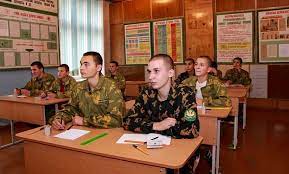 On June 12, 2021, World Day Against Child Labor, we launched our campaign against child and adolescent slave labour. First, we founded a petition against illegal child labour in prisons. We talked about children in a closed-type specific vocational school and how much they get for their job. We demanded not to buy the products of the Belarusian enterprises of the Department for the Execution of Punishments, as underage boys and girls may be involved in its production. After all, children at work get injured, spoil their health, and the money they earn ends up in the officials’ pockets and security officials.
On June 12, 2021, World Day Against Child Labor, we launched our campaign against child and adolescent slave labour. First, we founded a petition against illegal child labour in prisons. We talked about children in a closed-type specific vocational school and how much they get for their job. We demanded not to buy the products of the Belarusian enterprises of the Department for the Execution of Punishments, as underage boys and girls may be involved in its production. After all, children at work get injured, spoil their health, and the money they earn ends up in the officials’ pockets and security officials.
We touched on the topic of slave labour of children in later materials. In August 2021, we talked about slave labour in Belarusian schools, colleges and universities. Sometimes it ends in tragedy, and children die in the fields where adults send them. Another text was published in October this year. We talked about children forced to do agricultural work, knitting brooms for sale and cleaning the school’s territory instead of lessons.
In July, we began to talk about how children live in closed specific institutions. In the text about the reception centre, we touched upon the physical punishment of children in such places, their inability to study and see their parents, the imprisonment of children of illegal migrants there. We talked about the cruelty of employees of closed-type schools, about how children are forced to flee from institutions. We clarified that educators search all things and parcels of children, read letters and listen to their speech on the phone. Internet access is also limited – boys and girls cannot report violations and abuse of power by the school administration. In August, a video about the life of children in prisons and why orphans so easily fall for drug traffickers got released on the YouTube channel “NASH DOM TV”. In September 2021, we prepared an interview with Ukrainian human rights activist Serhiy Pernikoza, to whom he spoke about the life of children in closed specific institutions. In November, Svetlana Tarabanova, an expert on children’s rights, coordinator of the direction for the rights of the child protection of the Women’s Consortium of Ukraine, spoke about children’s reception centres.
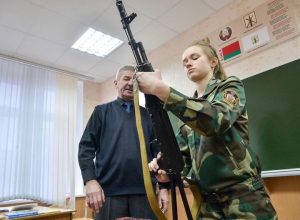 Speaking about children, we could not ignore another important topic – education. Moreover, on August 24, Lukashenka announced a “complete reboot” of the education system. For Knowledge Day, we have released materials about the Belarusian school. In the first of them, we talked about the innovations in the education system in Belarus: the closure of schools for ethnic minorities, the disappearance of Belarusian-speaking schools and schools in villages, and how the state does not allow children with disabilities to study. In the second article, we talked about children who cannot get a certificate in prison because there are no legislative norms. We devoted another text to bullying children in schools across the country.
Speaking about children, we could not ignore another important topic – education. Moreover, on August 24, Lukashenka announced a “complete reboot” of the education system. For Knowledge Day, we have released materials about the Belarusian school. In the first of them, we talked about the innovations in the education system in Belarus: the closure of schools for ethnic minorities, the disappearance of Belarusian-speaking schools and schools in villages, and how the state does not allow children with disabilities to study. In the second article, we talked about children who cannot get a certificate in prison because there are no legislative norms. We devoted another text to bullying children in schools across the country.
At the end of the year, we returned to the topic of Decree No. 18, according to which the guardianship authorities can take children from families if the parents did not pay utility bills or protested too actively. This time we paid attention to rural children whose parents cannot earn a lot of money. Because of this, guardianship services showed an increased interest in children from rural families. Our monitoring was devoted to the stories of mothers from the village whose children were taken away.
On November 23, 2021, various public organizations of Belarus, Ukraine, Russia, Moldova got together to discuss the problem of the availability of reception centres. The meeting was attended by the ICCI «Our House» head, Olga Karach. She raised the issue of refugee children in Belarus and noted that this issue concerns both refugee kids in Belarus and the Belarusian children who live abroad. In December, we summed up the results of the advocacy campaign dedicated to the humanization of closed institutions for children in Belarus. For six months, the total audience coverage for the advocacy campaign amounted to more than 200,000 users.
The New Year is a new challenge for Belarusian children and for us, those who protect them. We continue to cover the childhood problems in Belarus at all levels and will not deviate from our principles next year. And, of course, let’s hope that Belarusian children, like adults, will find freedom as soon as possible.




